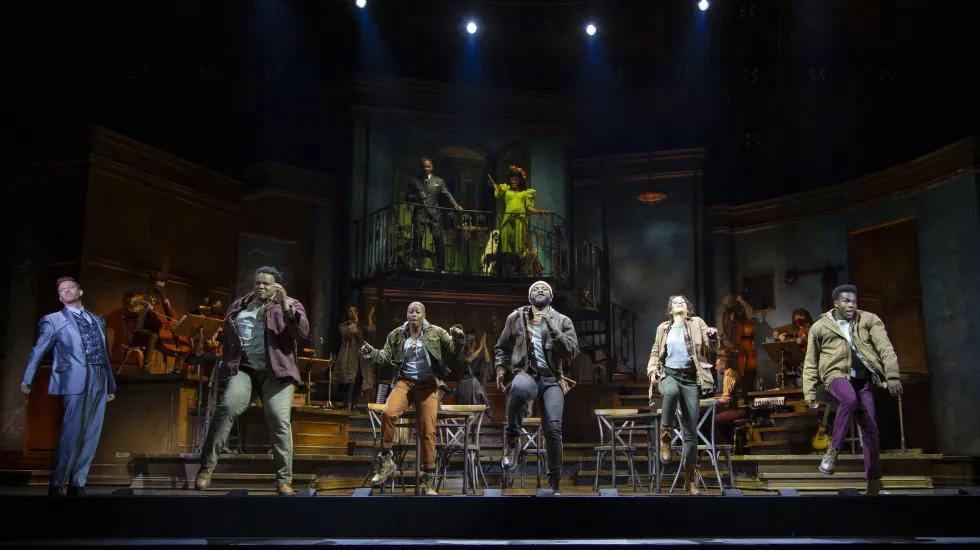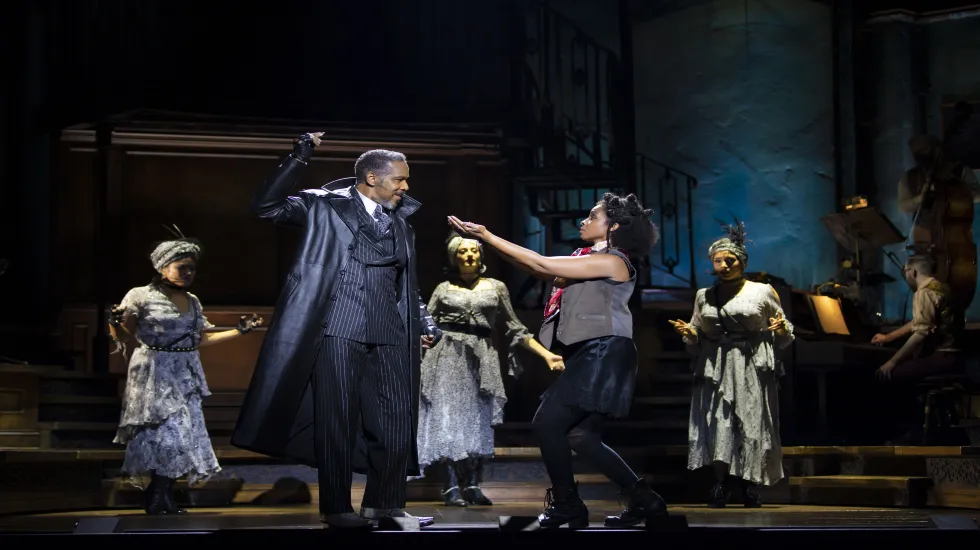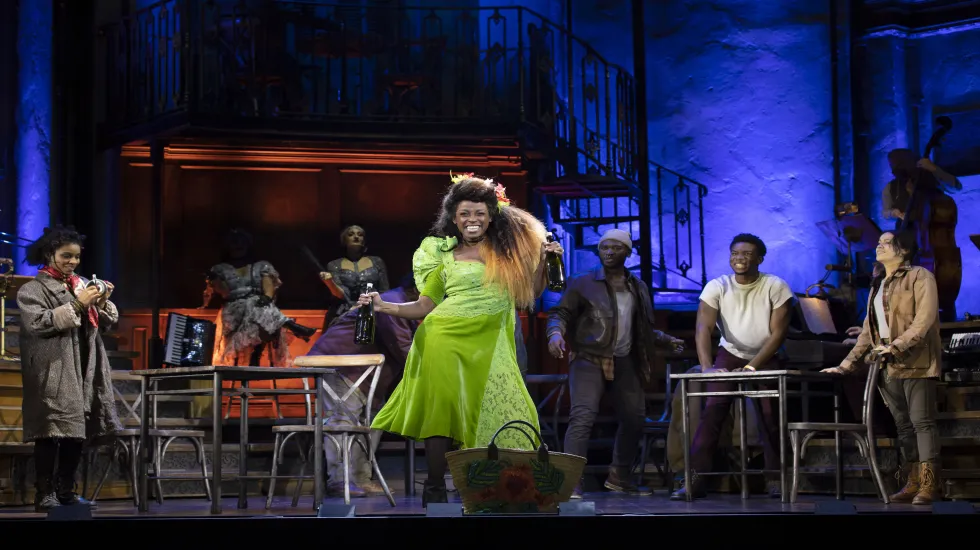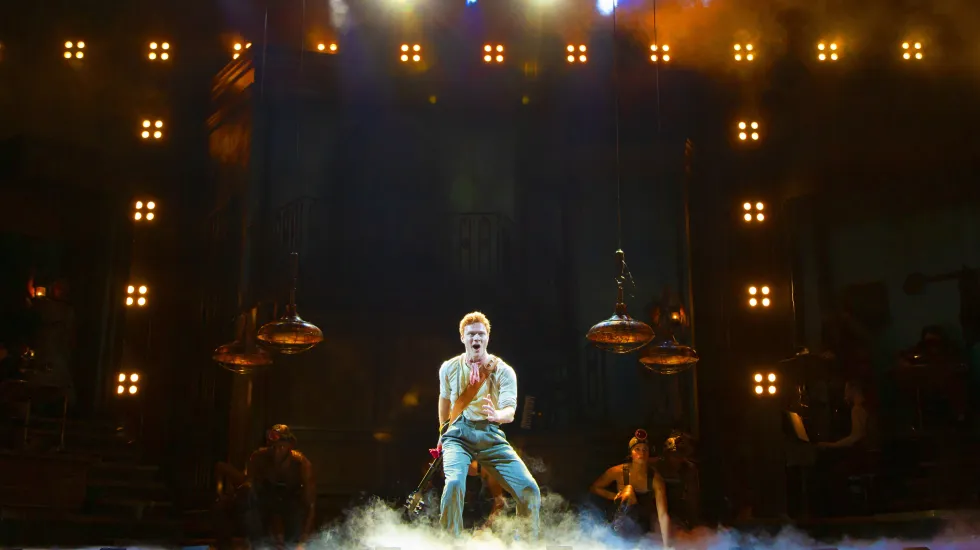
Looming dread and jubilant hope exist side by side in “Hadestown,” the scorching, stunning eight-time Tony Award-winning musical inspired by an ancient Greek myth. That juxtaposition of opposites — dread and hope, joy and despair, abundance and scarcity —make the musical by Anais Mitchell (music, book, and lyrics) and developed with director Rachel Chavki, both unmistakably timely and irresistibly entertaining.
With a mesmerizing, blues-infused score and masterful storytelling, “Hadestown” follows the rough outline of the aforementioned myth: Eurydice (Morgan Siobhan Green) is perpetually hungry and struggling as she roams the world. She’s ground down by the Fates (Belén Moyano, Bex Odorisio and Shea Renne) until, starving and exhausted, she falls into the clutches of Hades (Kevyn Morrow), King of the Underworld.
As Eurydice’s lover Orpheus (Nicholas Barasch) embarks on a hero’s quest to save her, he’s forced to examine his belief that people and gods are fundamentally good. At the mercy of the tyrannical, angry King Hades (Kevyn Morrow), Orpheus watches in anguish as the underworld king transforms a world of light, warmth and plenty to one of bleak, lifeless winter. Hades’ Queen Persephone (Kimberly Marable), meanwhile, revels in rebirth, springtime and the verdant abundance — except for the six months of winter when she’s trapped underground.
When: Through March 13
Where: CIBC Theatre, 18 W. Monroe
Tickets: $52.50 - $147.50
Run-time: 2hours, 25 minutes, including one 10-minute intermission
Info: BroadwayinChicago.com
The narrator for this imaginative, reconstituted tale of scarcity and abundance is Hermes (Levi Kreis), the fleet-footed messenger god. Flanked by an onstage band, Kreis helps the ensemble spin the story with vivid images and spectacular vocals. Mitchell’s score spans at least four octaves, from the sub-basement velvety growl of Hades’ “Hey Little Songbird,” (Morrow is as irresistible as a morphine drip) to the heights of Orpheus’ delicate, piercing falsetto (delivered with spun-glass clarity by Barasch).
As Eurydice, Green creates an eminently recognizable character struggling to simply hold her own in a harsh world. Lured by the promise of Hadestown — where jobs in King Hades’ vast foundries and furnaces are always and available and food is never short — Eurydice reluctantly takes her place in the underworld.

That sets Orpheus off on his hero’s quest, which is made richer and deeper by the story of King Hades and Queen Persephone, lovers eons beyond the dewy-eyed youth of Orpheus and Eurydice.
A chorus of “workers” (Lindsey Hailes, Chibueze Ihuoma, Will Mann, Sydney Parra, and Jamari Johnson Williams) surround and propel the action: In the lower depths of Hades’ vast Underworld, choreography and chorus create searing images of endless, repetitive, manual labor, the work of people shoveling coal into the maw of a furnace or hacking away in a sunless mine.
Yet for all its unmistakably intense themes, “Hadestown” is no dismal slog through an existential crisis about whether good or evil dominates the worlds of gods and mortals. It is a joyful, percussive, gorgeously sung and beautifully told pair of love stories. Like all love stories, they are ultimately tinged with loss.

Marable’s Persephone is radiant throughout. She’s a playful, charismatic goddess with verve and smarts to spare, coupled with an authority that’s as regal as it is stone-cold intimidating. Persephone is also not to be trifled with; in numbers such as “Our Lady of the Underground,” Marable makes that brilliantly clear. And when she warns of the rising seas and destruction caused by Hades’ endless industrialization, it’s with prophetic, Cassandra-like intensity.
Tony-winner Rachel Hauck’s set evokes the balconied architecture of French Quarter Louisiana and a bottomless abyss where souls are swallowed by clanking, hissing, massive machinery. Bradley King’s Tony-winning lighting design frequently beams spots straight out at the audience, creating a disorienting glare that intensifies the peril of Orpheus’ journey.
And in David Neumann’s inventive choreography, “Hadestown” veers from the soaring, joyous energy of a sundrenched, old-time revival meeting to the convulsive insistent rhythms of miners swinging their pickaxes with Sisyphean despair. Michael Krass’ costume design is gorgeous: Quicksilver messenger Hermes is resplendent in glimmering, silver brocade. Persephone blooms with greens and oranges above Hadestown, is wrapped in funereal black below.
Director Chavkin keeps the pace worthy of Hermes. And when the entire cast lets loose on the irresistibly rhythmic “Way Down to Hadestown,” you’ll want to follow them to the depths and back.








